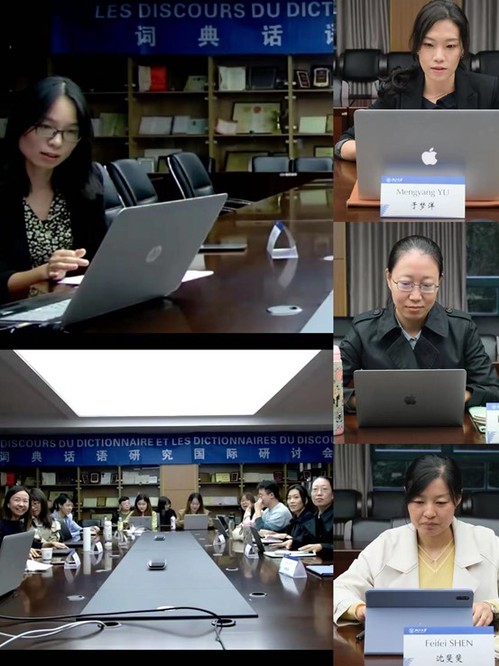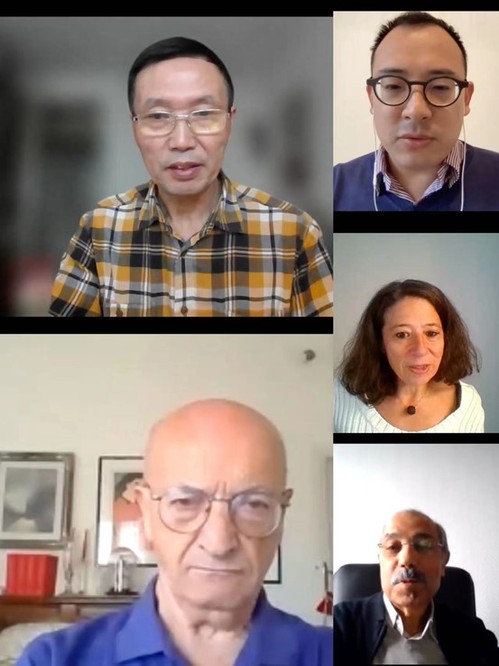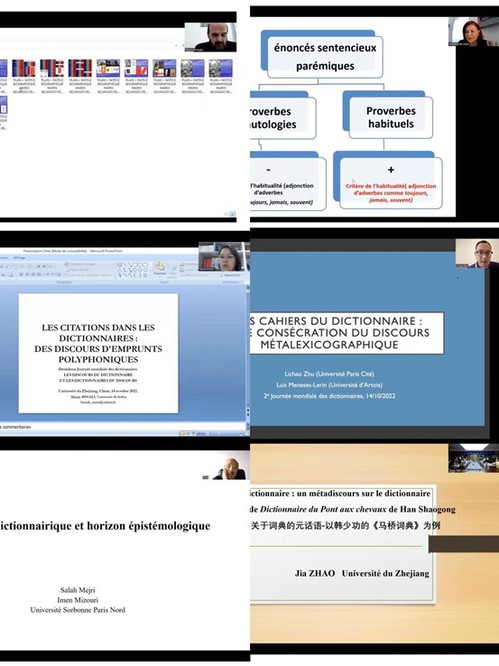On October 14, the International Symposium “The Discourse of Dictionary and the Dictionary of Discourse” was held by the Institute of French Language and Culture on Zijingang Campus, Zhejiang University. Those delivering keynote speeches at this online-cum-offline Symposium were experts and scholars from globally renowned universities, such as Université Sorbonne Paris Nord (formerly known as Université Paris XIII, France), Université Paris Cité (formerly known as Université Paris VII, France), Université de Bari Aldo Moro (Italy), Université de Cagliari (Italy), Université de Salerne (Italy), Université de Gafsa (Tunisia), Université de la Manouba (Tunisia), Nanjing University (China), Zhejiang University (China), and Zhejiang International Studies University (China).
Prof. ZHAO Jia, Deputy Dean of the School of International Studies at Zhejiang University and Deputy Director of the Institute of French Language and Culture, hosted the opening ceremony. She extended warm welcome to all participants, and reviewed the University’s and the School’s continued efforts with international academic exchange and cooperation. She expected this Symposium would be another chapter added to international collaboration and interdisciplinary research. In the end, she introduced the status quo of lexicographical studies in China.
Prof. Giovanni Dotoli of Université de Bari Aldo Moro (Italy) and Prof. Soumaya Mejri of Université Sorbonne Paris Nord (France) ensued with their speeches. As an acknowledged scholar of the French language in Italy, Prof. Giovanni Dotoli is honored with over 20 academic rewards, such as the French Legion of Honor, the Order of Academic Palms, and the Grand Prize of the French Academy of Letters. He convened the International Annual Conference of Lexicography, and suggested the theme of this Symposium. As an excellent professor of Université Sorbonne Paris Nord and Director of the laboratory “Lexicon, Dictionary, and Computer Processing” at French National Center of Scientific Research, Prof. Soumaya Mejri values Chinese academic and cultural traditions, and expressed his wish for the success of this Syposium.

On the topic of dictionary as discourse, the Symposium was divided into four panels, where scholars both at home and abroad made multidimensional and interdisciplinary discussions from the perspectives of linguistics, literature, and translation. The first panel was chaired by Associate Prof. ZHU Lichao of Université Paris Cité. Prof. ZHANG Xinmu of Nanjing University briefly introduced the history of French-Chinese dictionaries compiled in China and some major editions, and then focused on the significance and challenges of the compilation of French-Chinese Dictionary. Prof. ZHAO Jia of Zhejiang University focused on A Dictionary of Maqiao, a literary work by the Chinese writer HAN Shaogong, to explore the formal characteristics of dictionary-novels and to draw some reflections on dictionaries. She analyzed how dictionary-novels break the rules of dictionaries, and how the author uses them to expose the institutional power of dictionaries, the solidification of language in dictionaries, and the failure of dictionaries’ attempts to encompass all things. Prof. Sara Mejri and Prof. Iman Mizuri of Université Sorbonne Paris Nord explored the relationship between lexical discourse and the epistemological horizon, summarized the definition, types, and characteristics of lexical discourse, and elaborated on the epistemological horizon of discourse in terms of the ideas condensed in discourse, arguing that the lexicon concentrates on the world of ideas encapsulated in words and the will conveyed by discourse, and that the relationship between lexicographical discourse and the epistemological horizon is reciprocal, emphasizing that any analysis of language is necessarily linked to the culture it conveys. Prof. Giovanni Dotoli of Université de Bari Aldo Moro drew upon his monograph On the Origin of Language—as well as discourse theories by Saussure, Benveniste, Barth, and Foucault—to clarify the importance of lexicographical discourse. He also argued that the discourse should be examined in the context of culture, and pointed out the inseparability of lexicon, literature, art, and other disciplines.
The second panel was chaired by Prof. ZHANG Xinmu of Nanjing University. Associate Prof. ZHU Lichao of Université Paris Cité reviewed the development of lexicographical studies and related thematic and theoretical research achievements, centering around the establishment of the international journal Dictionary Handbook. He considered Dictionary Handbook as a well-positioned journal, which has published a large number of studies of dictionaries, thus promoting the digital research of dictionaries, and making contributions to lexicographical research. Ms. Monia Buari of Université de Gafsa explored citations in dictionaries from the perspectives of definition, selection criteria, utility, and plurality, emphasizing that lexicographical discourse is a heterogeneous discourse, which is similar to a polyphonic corpus that serves the study of linguistics and literature. Mr. Duha Raimi and Ms. Turaya Ben Amor of Université de la Manouba studied fixed discourse lexicon in terms of definition, criteria, analysis of fixed discourse predicates, and translation of fixed discourse in an attempt to understand fixed discourse lexicon as a specific sequence of predicate content. They argued that the method would help to translate fixed discourse in different languages, to break through the traditional method of classifying words according to themes, and to rethink the typology of fixed discourse.

The third panel was hosted by Prof. Giovanni Dotoli of Université de Bari Aldo Moro. Mr. Mario Selvaggio of Université de Cagliari discerned the definitions of dictionaries and encyclopedias, and analyzed the discourses of encyclopedias and dictionaries, which are believed to be closely related in that both restore the contents concerning science and art in the form of dictionaries. Ms. YU Mengyang, a researcher of ZJU 100 Global Recruitment Program, discussed the compilation of dictionaries of endangered, non-written languages with the case of Oroqen language. She introduced the urgency to preserve endangered languages and the importance of dictionaries in the undertaking. After elaborating on the features of Oroqen language, she affirmed the significance of the two existing dictionaries of Oroqen language in China. Then, by drawing upon the relevant theories and practices of Bernard Quemada, a French lexicologist, and André Martinet, father of French functional linguistics, she offered further thoughts on how to compile dictionaries of Oroqen language. She highlighted that the compilation of dictionaries of endangered language plays an important role in the preservation of endangered languages and in the construction of identity for the younger generation. Ms. SHEN Feifei, a young scholar of Zhejiang International Studies University, conducted a lexicographical study based on the New French-Chinese Dictionary published by the Commercial Press in 1910. She introduced the New French-Chinese Dictionary in terms of entries, authors and historical background, and compared it with the French Larousse Dictionary published in 1889. She argued that the New French-Chinese Dictionary is not simply a Chinese translation of French Larousse Dictionary, but a modern bilingual dictionary compiled with Chinese characteristics in response to the needs of French learners in China.
The fourth panel with hosted by Prof. ZHAO Jia of Zhejiang University. Ms. Maria Domenica Lo Nostro of Université de Salerne investigated the lexical-cultural discourse in bilingual dictionaries. Her research focused on the cultural properties of lexicographical discourse and the paradoxical phenomena present in the discourse. She pointed out that lexicographical discourse is a discursive fragment that makes possible a dialogue between two or more languages. She introduced the lexical-cultural theory of Robert Galisson, a contemporary French linguist, and continued to explore lexical culture in dictionaries in the context of global lexical culture. Associate Prof. ZHANG Fang of Zhejiang University examined the role and application of electronic dictionaries in teaching French in China. After showing three types of electronic dictionaries and their development, she analyzed the characteristics of those electronic dictionaries, and explored why electronic dictionaries are popular among Chinese learners, what role electronic dictionaries play, and how electronic dictionaries help learners improve their language proficiency.

Following those panels, Prof. Giovanni Dotoli of Université de Bari Aldo Moro, Prof. Soumaya Mejri of Université Sorbonne Paris Nord, and Prof. ZHANG Xinmu of Nanjing University held another round of discussions that was comprehensive, in-depth, heated, and friendly. To conclude, Prof. ZHAO Jia, Prof. Giovanni Dotoli, and Prof. Soumaya Mejri delivered closing speeches in which they summarized the Symposium and expressed expectations for future symposia.
This Symposium was an interdisciplinary and intercultural gathering of global scholars from China, France, Italy, and Tunisia. Not only was the academic avenue of lexicography and discourse studies expanded, but also was an important platform for international exchange and cooperation established, through the dialogues between literature and linguistics, between theories and practices, and among multilingual cultures.
Text: WU Shuiyan
Photos: CHEN Yuanyuan
Institute of French Language and Culture
Translated by CAI Zhengwu
Proofread by XU Xueying



